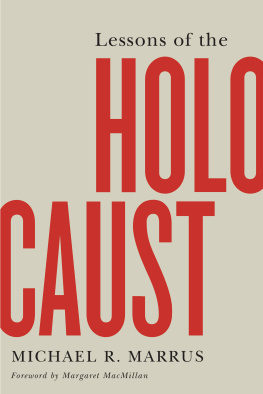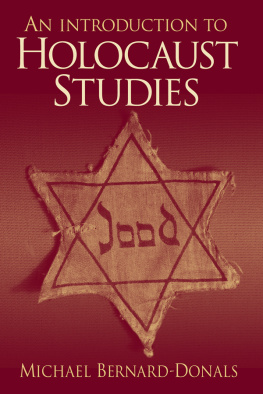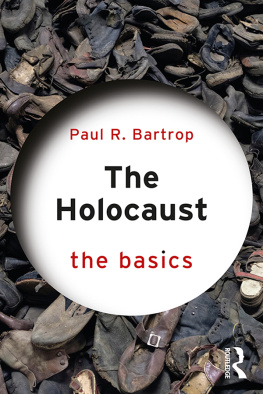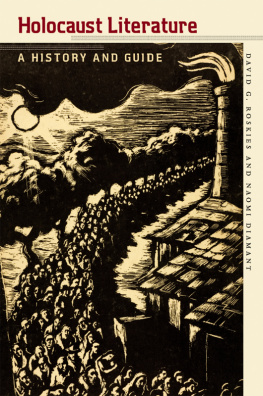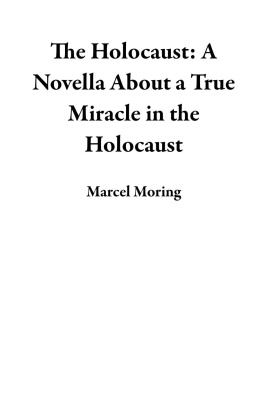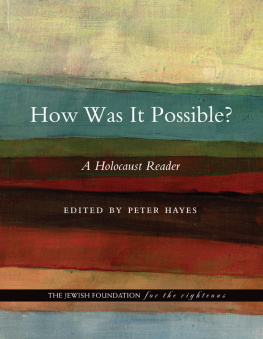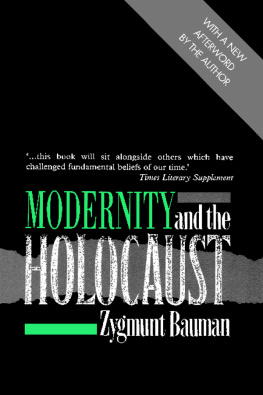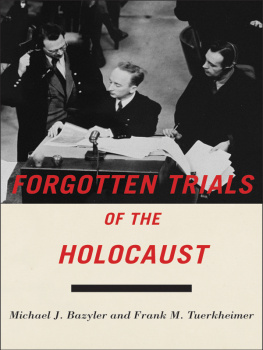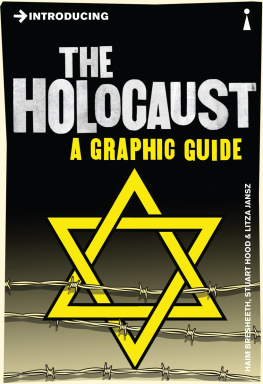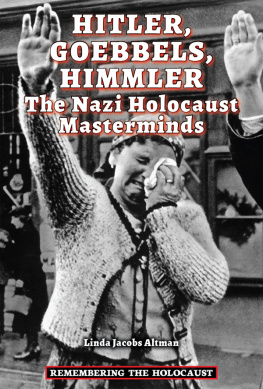MacMillan Margaret Olwen - Lessons of the Holocaust
Here you can read online MacMillan Margaret Olwen - Lessons of the Holocaust full text of the book (entire story) in english for free. Download pdf and epub, get meaning, cover and reviews about this ebook. City: London;Buffalo;Toronto, year: 2016, publisher: University of Toronto Press, genre: Politics. Description of the work, (preface) as well as reviews are available. Best literature library LitArk.com created for fans of good reading and offers a wide selection of genres:
Romance novel
Science fiction
Adventure
Detective
Science
History
Home and family
Prose
Art
Politics
Computer
Non-fiction
Religion
Business
Children
Humor
Choose a favorite category and find really read worthwhile books. Enjoy immersion in the world of imagination, feel the emotions of the characters or learn something new for yourself, make an fascinating discovery.
- Book:Lessons of the Holocaust
- Author:
- Publisher:University of Toronto Press
- Genre:
- Year:2016
- City:London;Buffalo;Toronto
- Rating:4 / 5
- Favourites:Add to favourites
- Your mark:
- 80
- 1
- 2
- 3
- 4
- 5
Lessons of the Holocaust: summary, description and annotation
We offer to read an annotation, description, summary or preface (depends on what the author of the book "Lessons of the Holocaust" wrote himself). If you haven't found the necessary information about the book — write in the comments, we will try to find it.
Lessons of the Holocaust is the perfect guide for the general reader to the historical and moral controversies which infuse the interpretation of the Holocaust and its significance.
Lessons of the Holocaust — read online for free the complete book (whole text) full work
Below is the text of the book, divided by pages. System saving the place of the last page read, allows you to conveniently read the book "Lessons of the Holocaust" online for free, without having to search again every time where you left off. Put a bookmark, and you can go to the page where you finished reading at any time.
Font size:
Interval:
Bookmark:
Although difficult to imagine, sixty years ago the Holocaust had practically no visibility in examinations of the Second World War. Yet today it is understood to be not only one of the defining moments of the twentieth century but also a touchstone in a quest for directions on how to avoid such catastrophes.
In Lessons of the Holocaust, Michael R. Marrus challenges the notion that there are definitive lessons to be deduced from the destruction of European Jewry. Instead, drawing on decades of studying, writing about, and teaching the Holocaust, he shows how its lessons are constantly challenged, debated, altered, and reinterpreted.
A succinct, stimulating analysis by a world-renowned historian, Lessons of the Holocaust is the perfect guide for the general reader to the historical and moral controversies that infuse the interpretation of the Holocaust and its significance.
(UTP Insights)
MICHAEL R. MARRUS is the Chancellor Rose and Ray Wolfe Professor Emeritus of Holocaust Studies at the University of Toronto. He is the author or co-author of eight books, including the award-winning The Holocaust in History.
MARGARET MACMILLAN
If I had to walk through a minefield I would like someone like Michael Marrus to lead me. He is calm, careful, and wise. He would research the location of the mines thoroughly before he moved. As an historian who navigates the complex and highly emotional field of Holocaust history, he is exactly the sort of guide one wants. What he has to say here in this brave and thoughtful book will not please those who want the Holocaust to offer clear lessons that will provide guidance for the future but his views demand our attention and respect.
Marrus leaves to others the search for moral or ethical lessons from the Holocaust. His aim is at once modest and highly important. While he does not diminish for an instant the horror of the German attempt to destroy Europes Jews, he says we must try to understand it as an historical event as well as a moral challenge. If we are going to talk about the Holocaust we need to know what it is we are talking about. Without rooting the Holocaust in history we can make assertions about its meaning, as many have, but we deprive ourselves of knowledge in our attempt to understand it. Understanding for Marrus means accumulating as much evidence as possible and weighing the different types of explanations.
He is cautious when it comes to using analogies to link the Holocaust to other historical events. It depends, he says. Analogies are helpful when they open up possibilities or help us raise questions but they can trap us into thinking along rigid lines. He is also wary of single explanations such as Daniel Goldhagens, who argued that the Holocaust grew out of a deep rooted German antisemitism. As Marrus points out, France and Russia were probably the two countries in Europe before 1914 where antisemitism was at its most virulent but neither undertook the mass genocide of the Jews.
Historians, Marrus argues, rightly in my view, must remain open to alternative possibilities and to complex explanations. And history, he insists, has its own rules and its own demands. He situates himself firmly in the empirical traditions of the English-speaking world. Any claim must be backed by solid evidence. Although he has worked in France on French history, he is not enamoured of the grand patterns so loved by French-speaking historians. Where some of his French colleagues have talked about the duty owed to memory, and about the need to draw clear moral lessons from the past, he remains skeptical of the claims that the memories of those who were there provide an accurate representation of what happened. Memory, as we now increasingly realize, is malleable and subject to change and that is different from history. Others will put up the monuments and the centres to memorialize the past; historians must, as they should, challenge the myths of both memory and memorialization.
It is not easy, however, to consider the Holocaust as we might the French Revolution or the American Civil War, partly because it is still too close to us in time but also because there is something unique about it. It is hard to disagree with Arno Mayer, himself a very distinguished historian, who described the Holocaust, as a fundamental touchstone of the depth and extremity of the dislocation of Western civilization during the first half of the twentieth century.
The very nature of the Holocaust makes us as humans want to explain it. If we can isolate why it happened, explain why so many ordinary Germans turned to evil, then like doctors finding a dangerous virus, we might hope to find a preventative or even a cure to such an appalling weakness in human nature. Surely, and it is an understandable feeling, such a monstrous event must have lessons; it must offer an inoculation against the future failings of humankind. And surely there must be a redemptive message somewhere. Over the years the need to forestall another Holocaust has understandably become part of the public discourse, used by philosophers, theologians, politicians, or simply concerned human beings.
As the years have gone there have been many attempts to bring out the lessons of the Holocaust but too often, as Marrus points out, what emerges is too vague to be helpful. The mission of the National Holocaust Monument scheduled for Ottawa is to keep the lessons of the Holocaust within the national consciousness. The hope, says a statement on the website, is that by teaching current and future generations of Canadians the roots and causes of this atrocity, future acts of genocide will be prevented. Historians have not yet reached a consensus on what those roots and causes are. And they may never be able to. History, as Marrus points out, is an unending process to try to get as full a picture of the past as possible but getting agreement on causes is another matter.
An important part of this book is a history of the process in the past decades to understand the Holocaust and it is also the story of Marrus own growing absorption in the subject. When he was a student, first at the University of Toronto and then at Berkeley in the late 1950s and 1960s, the term itself was scarcely used and the events themselves barely studied. One of the first great works on the subject, Raul Hilbergs, which was published in 1961, had as its title The Destruction of the European Jews. In what is partly his own intellectual biography, Marrus traces his growing absorption in the emerging subject of the Holocaust. He immersed himself in the writing by those such as Hannah Arendt and Emil Fackenheim who tried to come to terms with the meaning of the Holocaust. He followed the debates about whether it was something unique in human history or whether parallels could be drawn with other mass murders of people carried out solely on the grounds of who they were. He was drawn into the arguments about whether some Jews were complicit in their own peoples destruction or whether it was the complicity of the rest of the world that allowed the catastrophe to happen. He warns against reading into the past what we now know and reminds us that we have to remember what pressures Jews and non-Jews were facing in their own times. Marrus has always gone to the archives and to the original sources and it is in writing the history that he has made his greatest contribution to understanding.
He doesnt mind moral lessons or admonitions although he prefers to leave them to others. He agrees that we ought to aim to be better as human beings but, as he says again and again, if we are going to use the Holocaust as irrefutable proof to support a particular position we must know what we are talking about. We must also be able to discern when political and other leaders are using the past for their own ends in the present. Prime Minister Benjamin Netanyahus outburst in October 2015, for example, where he claimed, inaccurately, that the Grand Mufti of Jerusalem suggested the Final Solution to Hitler, is not about getting the past straight but about consolidating political support in Israel and among its supporters in the wider world. As Tony Judt, another great historian of the 20th century, once wrote: We have attached the memory of the Holocaust so firmly to the defense of a single country Israel that we are in danger of provincializing its moral significance.
Font size:
Interval:
Bookmark:
Similar books «Lessons of the Holocaust»
Look at similar books to Lessons of the Holocaust. We have selected literature similar in name and meaning in the hope of providing readers with more options to find new, interesting, not yet read works.
Discussion, reviews of the book Lessons of the Holocaust and just readers' own opinions. Leave your comments, write what you think about the work, its meaning or the main characters. Specify what exactly you liked and what you didn't like, and why you think so.

